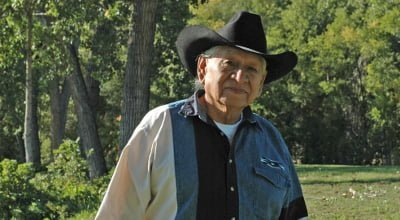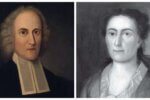Jerry Yellowhawk has spent his life trying to reach the Lakota Indians. His goal now is to translate the Bible into his native tongue.
Jerry Yellowhawk is no longer a clean-cut Native American pastor who wears a dark suit, white shirt and black tie. That is how he dressed in the 1960s, when he posed for the cover of a gospel album with a guitar in hand and his wife, Johanna, at his side.
Today, at age 66, Yellowhawk looks more comfortable. His raven-black ponytail–without a trace of gray–reaches down his back. He wears Wranglers, boots and T-shirts with brightly colored Native designs.
He is no longer trying to fit the white man’s mold of what a Christian should look like.
Yellowhawk is a quiet man. Like many Native Americans of his generation, he is disinclined to talk about himself. In fact, until his deep, dark eyes have had time to appraise your soul, he is reticent to talk much at all. You sense he simply wants to be about the Lord’s business, and that means reaching his people, the Lakota Sioux, by any means possible.
Raised on the Cheyenne River Indian Reservation in South Dakota, Yellowhawk accepted Christ in a Wesleyan Methodist church when he was 18. Six years later he graduated from the David Brainerd Memorial Bible College–a campus site that would later cause a haunting in his life–and became an assistant pastor in Pierre, South Dakota.
In 1966 he pioneered a church, Cheyenne River Lakota Chapel, and pastored it for 18 years. The church is now pastored by Danny LaPlante while Yellowhawk dedicates himself to translating the Bible into the Lakota language. (He is two years into a project with support from the American Bible Society and Wycliffe Bible Translators.) He also helps organize strategic Christian gatherings of indigenous peoples.
With more than 40 years of Christian service behind him–almost all of it as a pastor and missions leader in the Wesleyan Methodist church–Yellowhawk now stands at a crossroads. There is a pain in his past, caused by racism and hurtful misunderstandings from both secular society and the church. And he feels his future is undefined.
“Jerry is changing how we think about Native ministry,” says Native Christian leader Richard Twiss, who counts Yellowhawk as a mentor. “His goal is to move the Native work away from a missions model to a culturally sensitive approach to ministry.”
This new approach–called “cultural contextualization” by many–has prompted criticism from both white and Native branches of the church because Yellowhawk attends secular native powwows as well as Native Sacred Assemblies where cultural dress and music are used as expressions of Christian worship. The long hair, buckskins, headdresses and drums unsettle some.
“You would think 40 years of ministry would mean something,” says Yellowhawk, who is bothered by the suspicion and condemnation his unconventional work brings. “But if you mention ‘dance’ or ‘drums,’ some people get nervous.”
“Jerry is an elder,” explains Adrian Jacobs, an Iroquois-Cayuga from Ontario, who worked with Yellowhawk on the Wesleyan Native American Missions Board. “It is not the Lakota way for elders to impose themselves on anyone,” he adds, noting that Yellowhawk “did everything the denominational church wanted him to do.”
Jacobs, now an outreach worker with LAMP, the Lutheran Association of Missionaries and Pilots, explains some of his mentor’s pain: “He cut his hair, he wore a suit and tie, he preached three-point sermons and sang hymns, but his heart remained unassimilated. His heart remained with the Lakota people.”
That love for his people is one of the few things Yellowhawk will talk about. He earnestly desires to bring the love of Jesus to the Sioux and knows it may take the Native culture and Scripture in Native language to do it.
Assisted by Rosalie Little Thunder, he works several days a week translating the Bible into the Lakota dialect. “It is very exhausting work. I get weary. Sometimes I just need to get away and dance for a while,” he says, explaining how powwows help to keep him physically fit and peaceful.
Jacobs also explains how he and Jerry had a dream to purchase the Brainerd Bible School campus when it was offered for sale and to start a First Nations Institute. Instead, through a series of events, the campus was sold to The Nature Conservancy and the chance for a Native training center in their sacred Black Hills vanished.
The loss of land reopens wounds that run many generations deep, but Yellowhawk is warrior-stoic on the matter. If he has been wounded by injustice he does not voluntarily show his scars.
“Jerry is a model of quiet strength and determination to hold to his convictions,” says Mike Jacobs (no relation to Adrian), a Native worship leader and musician. “He has always taught us that you don’t trade one sin-stained culture for another to be a Christian.”
If Yellowhawk looks back with regret, he doesn’t cast stones at his former denomination or a white church that misunderstood him. Instead, he regrets his own former legalism. His rigid rules of conduct at home (including a strict policy forbidding any work on Sunday) and his earlier detachment from Lakota culture distanced him from two of his three children.
His son, well-known Native artist James Yellowhawk, is a believer. But his married twin daughters are not–reminding him why so many Native youth have rejected what they call “white man’s religion.”
Still, in his quiet way, Yellowhawk continues on–marching to the beat of his very different drum. He has, after all, an entire Bible to translate and a host of young Native Christian warriors to mentor.
John L. Moore writes Western novels and lives in Miles City, Mont.
For more information on Jerry Yellowhawk’s ministry, write to him at 4812 Meadow Drive, Rapid City, SD 57701. Send tax-deductible gifts to Christian Life Missions, P.O. Box 952248, Lake Mary, FL 32795-2248.







Leave a Comment
You must be logged in to post a comment.